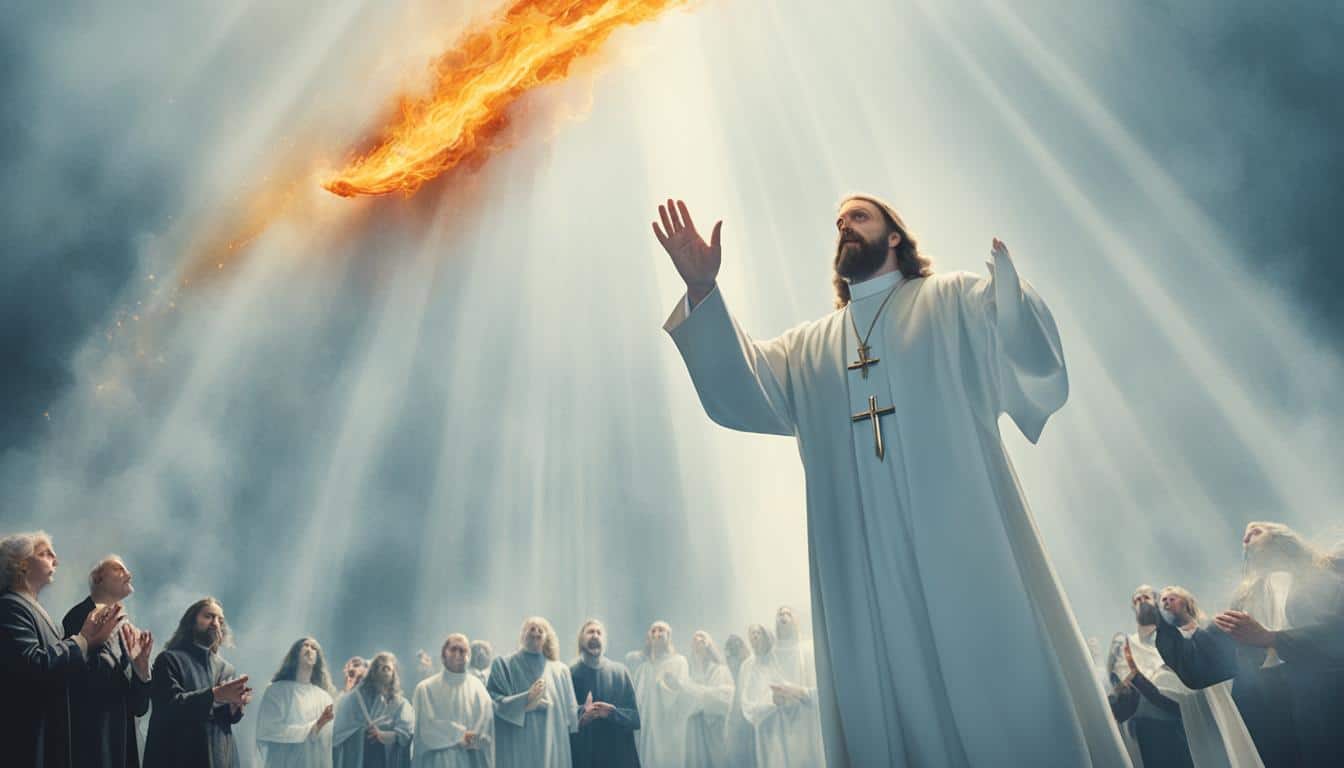Have you ever wondered how the Holy Spirit can transform your life and lead you to experiences of unparalleled joy and fulfillment? In the book of Acts, we witness the power of Holy Spirit Direction through five remarkable moments of divine guidance. These moments not only showcase the transformative power of the Holy Spirit but also demonstrate the incredible rewards that come from spiritual obedience. Are you ready to explore these life-changing moments and discover the true meaning of joy?
In this article, we delve into the pages of Acts and unravel the stories of Philip and the Ethiopian Eunuch, Peter and Cornelius, the selection of the first missionaries, Paul’s vision of the Man of Macedonia, and Paul’s Jerusalem journey. Each of these unique moments reveals the profound impact of following the Holy Spirit’s guidance, challenging common beliefs and inspiring us to embrace our calling.
Join us as we embark on a journey of faith and uncover the blessings that await those who heed the Holy Spirit’s direction. Let your heart be open to the transformative power of Holy Spirit Direction, and prepare to experience a joy that can only come from walking in alignment with God’s purposes.
Moment of Guidance: Philip and the Ethiopian Eunuch (Acts 8:26-40)
One of the most remarkable moments of Holy Spirit Direction in the book of Acts is the encounter between Philip and the Ethiopian Eunuch. In Acts 8:26-40, we witness the Holy Spirit directing Philip to go to the desert road that leads from Jerusalem to Gaza.
As Philip obediently follows the Spirit’s guidance, he comes across the Ethiopian Eunuch, a high-ranking official in the court of the Queen of Ethiopia. The eunuch, a devout man, had come to Jerusalem to worship and was returning home, sitting in his chariot, reading from the book of Isaiah.
“Do you understand what you are reading?” Philip asked.
“How can I, unless someone guides me?” the eunuch replied, inviting Philip to join him in the chariot.
In that moment, Philip seizes the opportunity to share the gospel with the Ethiopian Eunuch. He explains the prophecy in Isaiah, pointing to Jesus as the fulfillment. The eunuch’s heart is stirred, and he expresses his desire to be baptized. Philip, recognizing his sincere faith, baptizes him right there on the desert road.
This encounter between Philip and the Ethiopian Eunuch showcases the transformative power of following the Holy Spirit’s guidance. Through Philip’s obedience, the eunuch experiences conversion and baptism, experiencing the joy and fulfillment that come from surrendering to God’s purposes.
Key Takeaway: Obeying the Holy Spirit opens doors for sharing the gospel and impacting lives, even in unexpected places.
| Philip and the Ethiopian Eunuch (Acts 8:26-40) | Key Elements |
|---|---|
| Event: Philip encounters the Ethiopian Eunuch on the desert road to Gaza. | The Holy Spirit directs Philip to go to the desert road. Philip encounters the Ethiopian Eunuch, a high-ranking official. |
| Conversation: Philip asks if the eunuch understands what he is reading, which leads to a deeper conversation about Jesus. | Philip explains the prophecy in Isaiah, pointing to Jesus as the fulfillment. |
| Conversion and Baptism: The Ethiopian Eunuch expresses his desire to be baptized, and Philip baptizes him on the spot. | The eunuch experiences conversion and baptism, embracing the joy and fulfillment that come from surrendering to God’s purposes. |
Moment of Guidance: Peter and Cornelius (Acts 10:1-48)
In the book of Acts, we encounter a pivotal moment of Holy Spirit Direction as Peter receives a divine instruction to visit Cornelius, a Gentile. This encounter is significant as it breaks traditional Jewish boundaries and beautifully exemplifies God’s inclusive love and the expansion of the Christian community.
The story unfolds in Acts 10:1-48. Cornelius, a Roman centurion known for his devout faith, receives a vision from God, calling him to send for Peter in Joppa. Meanwhile, Peter is praying on a rooftop and receives a vision of a sheet with various unclean animals being lowered from heaven. A voice instructs Peter to kill and eat the animals, but Peter resists, knowing that they are considered unclean according to Jewish dietary laws.
Just as Peter ponders the meaning of the vision, messengers from Cornelius arrive at the house where he is staying. Guided by the Holy Spirit, Peter understands the broader significance behind the vision. The Holy Spirit instructs Peter to accompany the messengers to Cornelius’ house, disregarding the traditional barriers separating Jews and Gentiles.
“God has shown me that I should not call anyone impure or unclean.” – Acts 10:28
Upon arriving at Cornelius’ house, Peter realizes the purpose of his divine guidance. Cornelius, along with his family and close friends, eagerly awaits Peter’s arrival. As Peter begins to share the good news of Jesus Christ and the salvation offered to all, the Holy Spirit falls upon the Gentiles. Their inclusion in the outpouring of the Spirit confirms God’s acceptance and inclusive love for all people, regardless of their background or ethnicity.
This encounter with Cornelius marks a crucial turning point in the early Christian community. It opens the door for the widespread acceptance and inclusion of Gentiles within the expanding Christian movement. The breaking of traditional boundaries and the recognition of God’s inclusive love serve as a powerful reminder that no one is beyond the reach of God’s grace. This moment sets the stage for the growth and diversity of the Christian community, emphasizing the universal nature of God’s redemptive plan.
This story of Peter and Cornelius challenges us to examine our own biases and preconceived notions. It reminds us of the transformative power of the Holy Spirit’s guidance, which can lead us to new understandings and break down barriers that hinder love and unity.

Through the inclusion of Cornelius and his household into the Christian community, we witness the expansion of God’s love and the breaking of long-standing cultural and religious boundaries. This moment not only highlights the transformative work of the Holy Spirit but also serves as an inspiration for us to embrace a more inclusive and diverse community of believers.
Moment of Guidance: The Selection of the First Missionaries (Acts 13:1-3)
Continuing our exploration of the transformative power of Holy Spirit Direction in the book of Acts, we now come to a significant moment when the Holy Spirit directs the early church to set apart Barnabas and Saul for missionary work. This moment, documented in Acts 13:1-3, marks a crucial turning point in the spread of the gospel and the establishment of Christian communities in various regions.
The Holy Spirit’s guidance becomes evident as the early church engages in worship and fasting. It is during this time that the Spirit speaks and sets apart Barnabas and Saul, commissioning them for the important task of sharing the message of salvation.
“While they were worshiping the Lord and fasting, the Holy Spirit said, ‘Set apart for me Barnabas and Saul for the work to which I have called them.’ So after they had fasted and prayed, they placed their hands on them and sent them off.” – Acts 13:2-3
This guidance from the Holy Spirit demonstrates the divine intervention that occurs when we align ourselves with God’s will and purpose. The selection of Barnabas and Saul as the first missionaries not only emphasizes the significance of their role but also highlights the power of the Holy Spirit working through individuals to fulfill God’s plan.
Barnabas and Saul embark on their missionary journeys, traveling to regions including Cyprus, Antioch, Iconium, Lystra, and Derbe. Their tireless efforts and commitment to sharing the gospel lead to the establishment of Christian communities and the spread of the transformative message of salvation.
Through their missionary work, Barnabas and Saul encounter challenges and opposition, yet they remain steadfast in their reliance on the Holy Spirit’s guidance. Their unwavering commitment and dedication serve as an inspiration for future generations of missionaries, demonstrating the joy and fulfillment that come from obediently following the Spirit’s leading.
| Key Elements | Impacts |
|---|---|
| Selection of Barnabas and Saul | The pioneer missionaries who spread the gospel across various regions, establishing Christian communities |
| Divine Intervention | The Holy Spirit’s guidance leads to the fulfillment of God’s plan and purpose |
| Transformative Message | The gospel brings about spiritual transformation and salvation |
| Inspiration for Future Missionaries | Barnabas and Saul’s commitment and reliance on the Holy Spirit inspire generations of missionaries to follow |
Moment of Guidance: Paul’s Vision of the Man of Macedonia (Acts 16:6-10)
Another powerful moment of divine guidance in the book of Acts is Paul’s Vision of the Man of Macedonia, found in Acts 16:6-10. In this significant encounter, the Holy Spirit reveals a vision to Paul, redirecting his missionary efforts and leading to the founding of the Philippian church.
During Paul’s second missionary journey, he and his companions desired to preach the gospel in Asia, but the Holy Spirit prevented them from doing so. Instead, they were directed by the Spirit to go to Macedonia, a region unfamiliar to them at the time. This divine intervention opened new doors for the spread of the good news and played a crucial role in the expansion of early Christianity.
The vision itself is not explicitly described in detail, but its impact is profound. The Holy Spirit’s guidance through this vision demonstrated the importance of flexibility and obedience in missionary work. By redirecting Paul’s efforts to Macedonia, the Holy Spirit ensured that the gospel would reach the people of Philippi and lay the foundation for a thriving church.
“During the night Paul had a vision of a man of Macedonia standing and begging him, ‘Come over to Macedonia and help us.’ After Paul had seen the vision, we got ready at once to leave for Macedonia, concluding that God had called us to preach the gospel to them.” – Acts 16:9-10
This moment reminds us of the significant role that divine guidance plays in the success of our endeavors. It serves as a powerful example of the Holy Spirit’s ability to redirect our paths and lead us towards new opportunities for spreading the gospel. By following the Holy Spirit’s vision, Paul embarked on a journey that would forever impact the early Church and inspire future missionaries.

| Key Elements | Impact |
|---|---|
| Holy Spirit’s Vision | Redirected Paul’s missionary efforts |
| Founding of Philippian Church | Established a thriving Christian community |
| Flexibility and Obedience | Emphasized the importance of following divine guidance |
Moment of Guidance: Paul’s Jerusalem Journey (Acts 20:22-24; 21:10-14)
One of the most powerful moments of Holy Spirit guidance in the book of Acts is seen in Paul’s Jerusalem journey. Despite knowing the hardships and trials that await him, the Holy Spirit compels Paul to go to Jerusalem, showcasing his unwavering commitment to God’s will.
Paul’s journey exemplifies the strength and courage that come from following the Holy Spirit’s guidance, even in the face of adversity. It serves as a reminder of the transformative power of the Holy Spirit, empowering believers to press forward with unwavering faith and determination.
In the midst of trials and challenges, Paul’s journey illustrates the scriptural encouragement to find joy. Joy is not dependent on external circumstances but can be found through a deep reliance on the Holy Spirit and an unwavering commitment to God’s purposes.




